Introduction
Here are some examples of exercises for you to try. The exercises may be suggested for a condition or for rehabilitation. Start each exercise slowly. Ease off the exercises if you start to have pain.
You will be told when to start these exercises and which ones will work best for you.
How to do the exercises
Isolated thumb MP-joint extensor stretch
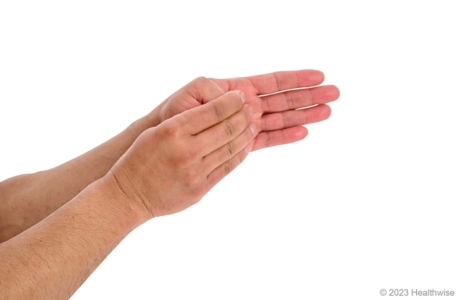
slide 1 of 5
slide 1 of 5, Isolated thumb MP-joint extensor stretch,
- Hold your hand in front of you, and turn your hand so your little finger faces down and your thumb faces up. (Your hand should be in the position used for shaking someone's hand.) You may also rest your hand on a flat surface.
- Use the fingers on your other hand to bend your thumb down at the point where your thumb connects to your palm.
- Hold for at least 15 to 30 seconds.
- Repeat 2 to 4 times.
- It's a good idea to repeat these steps with your other hand.
Finkelstein stretch
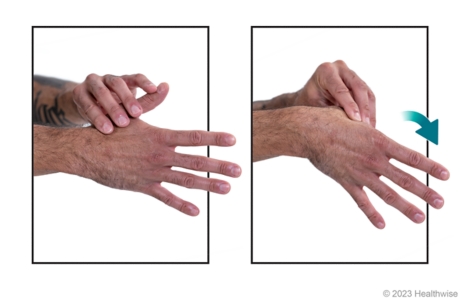
slide 2 of 5
slide 2 of 5, Finkelstein stretch,
- Hold your arms out in front of you. (Your hand should be in the position used for shaking someone's hand.)
- Bend your thumb toward your palm.
- Use your other hand to gently stretch your thumb and wrist downward until you feel a stretch on the thumb side of your wrist.
- Hold for at least 15 to 30 seconds.
- Repeat 2 to 4 times.
- It's a good idea to repeat these steps with your other wrist.
Thumb flexion and extension
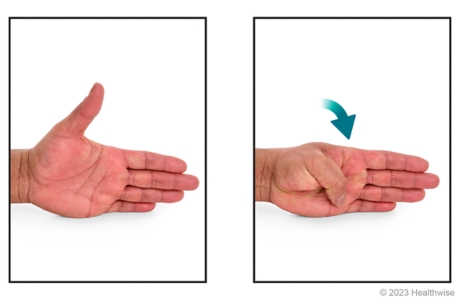
slide 3 of 5
slide 3 of 5, Thumb flexion and extension,
- Place your affected hand on a table with your thumb pointing up.
- Bend your thumb downward and across your palm. Your thumb should touch the base of your little finger.
- Hold for about 6 seconds. Then straighten your thumb.
- Repeat 8 to 12 times.
- It's a good idea to repeat these steps with your other hand.
Thumb adduction and abduction
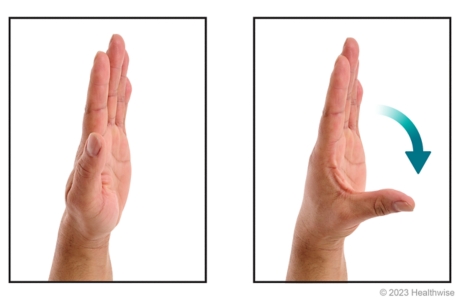
slide 4 of 5
slide 4 of 5, Thumb adduction and abduction,
- With your affected hand, point your fingers and thumb straight up. Your wrist should be relaxed and straight.
- Move your thumb away from your palm as far as you can. Hold for about 6 seconds. Then move your thumb back to the starting position, with your thumb resting against your index (pointing) finger.
- Repeat 8 to 12 times.
- It's a good idea to repeat these steps with your other hand.
Resisted radial deviation
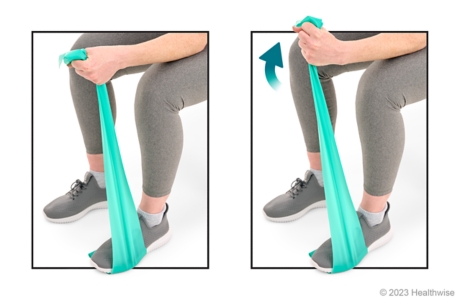
slide 5 of 5
slide 5 of 5, Resisted radial deviation,
- Sit leaning forward with your legs slightly apart. Then place your affected forearm on your thigh with your hand and wrist in front of your knee.
- Grasp one end of an exercise band with your hand facing toward your other thigh. Step on the other end of the band.
- Slowly bend your wrist upward for a count of 2. Then lower your wrist slowly to a count of 5.
- Repeat 8 to 12 times.
- It's a good idea to repeat these steps with your other arm.
Current as of: July 31, 2024
Author: Ignite Healthwise, LLC Staff
Clinical Review Board
All Healthwise education is reviewed by a team that includes physicians, nurses, advanced practitioners, registered dieticians, and other healthcare professionals.

